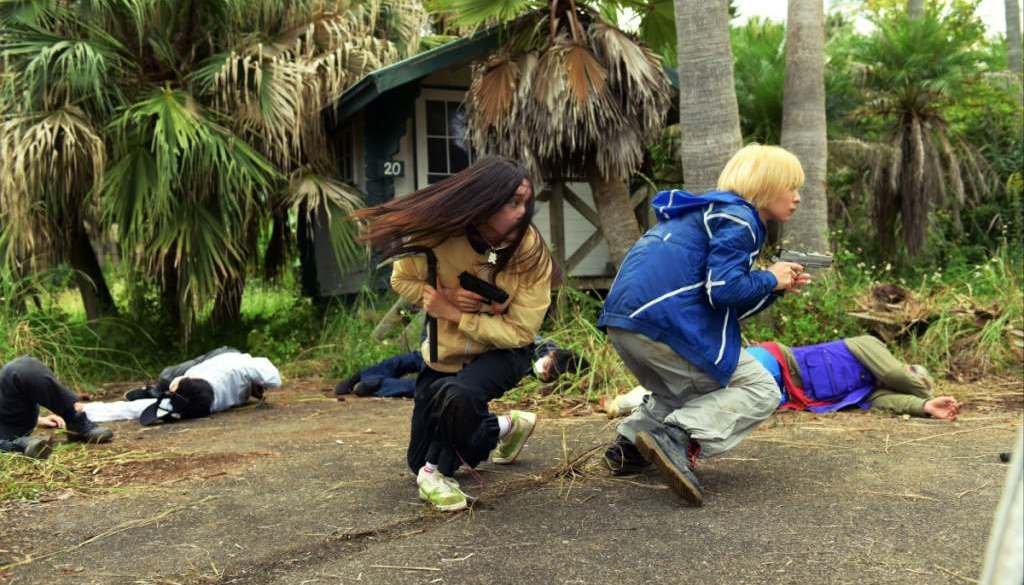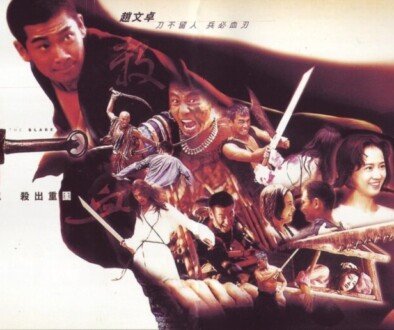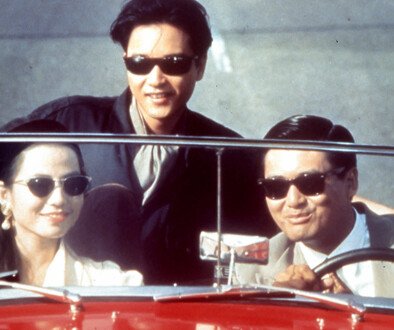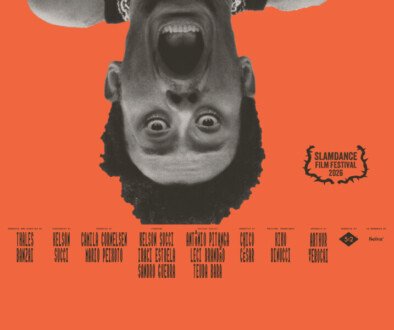NYAFF XXIII Review: In BABY ASSASSINS: NICE DAYS, A Killer Threequel That Thrills
8 min. read
Thanks to its ubiquitous approach to action and comedy, crafted brilliantly between the artistic vision of filmmaker Yugo Sakamoto and his chosen action director, Kensuke Sonomura, the Baby Assassins movies stand to comprise one of the most fruitful franchises of modern action cinema today. To that end, you also have to credit Sakamoto’s lead casting choices with his A Janitor co-stars, Akari Takaishi and Saori Izawa, taking their pre-existing screen chemistry and applying it to the Baby Assassins universe.
It is an original, and enriching world that has grown in four years, and continues to do so in a current total of now three features, the latest being Baby Assassins: Nice Days, which makes its World Premiere for the 23rd annual New York Asian Film Festival this month, ahead of a September release in Japan. Joining the franchise is a new character named Kaede (Sosuke Ikematsu). He is a stone killer, and a man on a mission – one that requires piling up a LOT of dead bodies. 150 of them. And, with the help of his personal manager, Tsutomu (Karuma), he may just reach his goal.
As it stands though, Kaede may have one more hurdle than he can afford with the unforeseen involvement of our two guilded assassins, Chisato (Takaishi) and Mahiro (Izawa), who’ve since taken a liking to their latest workcation surroundings in the town of Miyazaki, hundreds of miles away from their humble abode in Tokyo. Adding to the complexity of their escapist aspirations, it also happens to be Mahiro’s 20th birthday, arriving just as the two planned a dinner for the night. As seemingly always in stories like this, plans get cancelled or change, and here, the circumstances for Chisato and Mahiro change almost swiftly when their new hit-job is discovered to be an accidental double-booking, spotting Kaede moments before what would have been his 150th and final kill.
An impasse ensues, and it leads to a violent and explosive battle to see who’s the fastest between running, gunning, kicking and punching. Alas, the job is a bust, as well as a close call for Mahiro as she and Chisato are forced to regroup, and join forces with Guild members Minami (Atsuko Maeda), and her affable and sinewy partner Riku (Otani Mondo), to complete the guild’s assignment in a single order: kill Kaede, and THEN his intended target.
Baby Assassins: Nice Days, takes on the same, supple, quirky energy as its predecessors, allowing for leads Takaishi and Izawa to jam as comfortably in their element as they do. Their chemistry totally compliments each other in their performances, growing from characters who couldn’t get along very well in the first film, to sisters and confidants who operate in the field as apt partners with effectivity and precision. The script tackles the same rambling formula as well with our characters chatting away at random between varying topics for most of the way. It’s a warm and welcoming bond they share, and most crucially, the movie allows a deeper look into their cohesion as a pair with oddball tendencies.
Pertinent to the matter is the challenge the two stand to face with Minami, whose age and no nonsense demeanor deem her almost intolerable to her two underlings – most specifically to Chisato. Passive aggression eventually escalates until things come to a head, unavoidably serving as a testament to their ability to work as a team and resolve their differences. It’s a step that will especially prove vital if they are going to meet head-on the threat that comes their way with Kaede, whose membership in a rivaling organization serves as the backdrop for his development.
Kaeda and Mahiro share three key action sequences in the film, and the first is an introduction to their introspective turmoil in the film’s exploration to how they mirror one another. Midway into the film, as the team sets up camp at Kaede’s home expecting him to turn up so they can kill him, Mahiro takes to Kaede’s punching bag in a shot that dives into a series of flashbacks, chronicling Kaede’s ascent as a killer rising in the ranks.
We learn why Kaede has to kill so many people, and more importantly, we also see what drives him to keep descending into the cyclic, ominous mental space that consumes him during his quest; the pursuit of strength and influence as someone who has learned to kill with elite effect. The movie expands our look into these travails with the inclusion of the people Kaede works for, culminating further in a series of events that find Kaede ultimately killing one of his own, effectively driven into a manifestation of his madness that makes him the formidable antagonist he emerges as, as the element of kindness fades into the shadows where his humanity once was. It is through that scope where we come to learn what it is that Kaede really wants.

Par for the course for our plucky killer protagonists is the bustling, crackling fight choreography that fans have come to know and love from someone like Sonomura. For this, fans can expect a peculiar and interesting cameo from actor and stuntman Satoshi Kibe, who previously collaborated with Sonomura on his 2019 directing debut, Hydra. The centerpiece of the action however, opposite our leading ladies, is Ikematsu, whose physical capabilities I am told even surprised Sonomura while on set. There’s also actor Mondo whose role as Riku situates himself as more of a killer who relies on the pure strength of his muscles and empty-handed fighting skills – at least until situations call for him to finally take up arms.
Worth noting while we’re at is that Takaishi is a lot more involved in the action this time. She’s not the stunt-trained exponent that Izawa is, and so she’s built herself up in the franchise thusfar with carefully crafted sequences that make her look really amazing. In part three, you can tell she’s had more training in some areas, and taking just a few more risks along the way, which makes finally getting to see both Chisato and Mahiro in a classic two-on-one match up with a villain, so much more rewarding and fun. Moreover, it’s a finale drenched in blood that further bookends with Mahiro and Kaede in a decisive, blistering one-on-one to crown a winner.
The choreography lends a signature nod to the kind of quick thinking fans of the first film saw of Mahiro, and it also makes whole some of the passerby chatter we hear between our leads early in the movie. Characteristic to the film’s direction, the action also makes for an integral in-roads to the rivalry between Mahiro and Kaede. Mahiro, being the sociopath she is, is consistently self-relective, and longing to be just a little more sociable as her peers. Her introspection gets topped after the first fight scene when she’s forced to confront what went wrong and why, which makes her final fight with Kaede all the paramount.
Baby Assassins: Nice Days supplies audiences with action and comedy that are reinvigorates audiences in their revisit to Sakamoto’s world. It won’t be for everyone though, since not everyone will feel the same way others do about the action – indicative of the kinds of conversations action fans have who might he weary of the “John Wick-style” or the “Raid-style” some would unabashedly opine about in forums or on social media. Nevertheless, Sonomura’s action design only improves with every movie he works on, and it’s a caliber of creativity that works hand in hand with how movies and characters are written.
With three movies under their belt and Sakamoto and his team on track for a TV Tokyo series continuation, far be it for me to understate how fun these movies are. If you enjoyed the first two installments, Baby Assassins: Nice Days will reward you more than nicely, and for many days to come.
Baby Assassins: Nice Days screens for the New York Asian Film Festival which runs from July 12 through 28.
Native New Yorker. Been writing for a long time now, and I enjoy what I do. Be nice to me!






